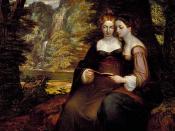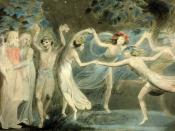In almost all of Shakespeare's plays, there is usually one major theme that he wants his audience to grasp. A Midsummer Night's Dream is no exception to this pattern. Shakespeare uses fictional characters interacting with realistic characters, to let the audience better understand the theme he wants to portray. Throughout A Midsummer Night's Dream, Shakespeare uses his poetical skills to show how difficult and confusing love can sometimes be.
Shakespeare starts the play off with Egeus protesting, his daughter, Hermia's love for Lysander. Although Hermia is truly in love with Lysander, her father demands that she marry Demetrius, which makes the love between Hermia and Lysander extremely complex. This invokes the theme of love's difficulty because Lysander cannot marry her openly. While Demetrius and Lysander fight over Hermia, Helena is stuck outside this "love triangle" fawning over Demetrius, without his love in return. Not only does he not love her, he despises her and calls her names.
Despite his name calling, she stays loyal with her love toward him. Love is extremely difficult for Helena because she has no control over Demetrius' love toward her. Demetrius is also experiencing what Helena is feeling. He loves Hermia but is not loved back. Love is not easy for the characters in the story. In A Midsummer Night's Dream, Lysander says, "The course of true love never did run smooth" (Act 1, Scene 1, Line 134).
When Puck mistakes Lysander for Demetrius and puts the love potion in his eyes, it changes the "love flow" around. When Lysander awakes to Helena's appearance and instantly falls in love with her, he tells her how beautiful she is and how he hates Hermia and only wants to be with her. Helena is bewildered and thinks he is mocking her. After Demetrius...


